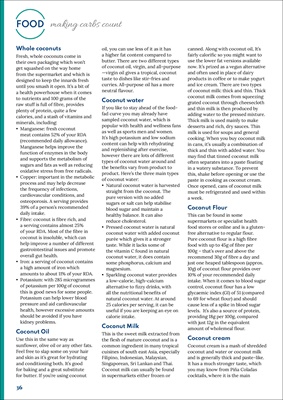
36
FOOD making carbs count
Whole coconuts
Fresh, whole coconuts come in
their own packaging which won't
get squashed on the way home
from the supermarket and which is
designed to keep the innards fresh
until you smash it open. It's a bit of
a health powerhouse when it comes
to nutrients and 100 grams of the
raw stuff is full of fibre, provides
plenty of protein, quite a few
calories, and a stash of vitamins and
minerals, including:
• Manganese: fresh coconut
meat contains 52% of your RDA
(recommended daily allowance).
Manganese helps improve the
function of enzymes in the body
and supports the metabolism of
sugars and fats as well as reducing
oxidative stress from free radicals.
• Copper: important in the metabolic
process and may help decrease
the frequency of infections,
cardiovascular conditions, and
osteoporosis. A serving provides
39% of a person's recommended
daily intake.
• Fibre: coconut is fibre rich, and
a serving contains almost 25%
of your RDA. Most of the fibre in
coconut is insoluble, which can
help improve a number of different
gastrointestinal issues and promote
overall gut health.
• Iron: a serving of coconut contains
a high amount of iron which
amounts to about 11% of your RDA.
• Potassium: with 285 microgrammes
of potassium per 100g of coconut
this is good news for some people.
Potassium can help lower blood
pressure and aid cardiovascular
health, however excessive amounts
should be avoided if you have
kidney problems.
Coconut Oil
Use this in the same way as
sunflower, olive oil or any other fats.
Feel free to slap some on your hair
and skin as it's great for hydrating
and conditioning both. It's good
for baking and a great substitute
for butter. If you're using coconut
oil, you can use less of it as it has
a higher fat content compared to
butter. There are two different types
of coconut oil, virgin, and all-purpose
-virgin oil gives a tropical, coconut
taste to dishes like stir-fries and
curries. All-purpose oil has a more
neutral flavour.
Coconut water
If you like to stay ahead of the foodfad curve
you may already have
sampled coconut water, which is
popular with health and wellness fans
as well as sports men and women.
It's high potassium and low sodium
content can help with rehydrating
and replenishing after exercise,
however there are lots of different
types of coconut water around and
the benefits vary from product to
product. Here's the three main types
of coconut water:
• Natural coconut water is harvested
straight from the coconut. The
pure version with no added
sugars or salt can help stabilise
blood sugar and maintain a
healthy balance. It can also
reduce cholesterol.
• Pressed coconut water is natural
coconut water with added coconut
purée which gives it a stronger
taste. While it lacks some of
the vitamin C found in natural
coconut water, it does contain
some phosphorus, calcium and
magnesium.
• Sparkling coconut water provides
a low-calorie, high-calcium
alternative to fizzy drinks, with
all the nutritional benefits of
natural coconut water. At around
25 calories per serving, it can be
useful if you are keeping an eye on
calorie intake.
Coconut Milk
This is the sweet milk extracted from
the flesh of mature coconut and is a
common ingredient in many tropical
cuisines of south east Asia, especially
Filipino, Indonesian, Malaysian,
Singaporean, Sri Lankan and Thai.
Coconut milk can usually be found
in supermarkets either frozen or
canned. Along with coconut oil, It's
fairly calorific so you might want to
use the lower fat versions available
now. It's prized as a vegan alternative
and often used in place of dairy
products in coffee or to make yogurt
and ice cream. There are two types
of coconut milk: thick and thin. Thick
coconut milk comes from squeezing
grated coconut through cheesecloth
and thin milk is then produced by
adding water to the pressed mixture.
Thick milk is used mainly to make
desserts and rich, dry sauces. Thin
milk is used for soups and general
cooking. When you buy coconut milk
in cans, it's usually a combination of
thick and thin with added water. You
may find that tinned coconut milk
often separates into a paste floating
in a watery substance. To prevent
this, shake before opening or use the
paste in cooking as coconut cream.
Once opened, cans of coconut milk
must be refrigerated and used within
a week.
Coconut Flour
This can be found in some
supermarkets or specialist health
food stores or online and is a glutenfree
alternative to regular flour.
Pure coconut flour is a high fibre
food with up to 45g of fibre per
100g - that's over and above the
recommend 30g of fibre a day and
just one heaped tablespoon (approx.
10g) of coconut flour provides over
10% of your recommended daily
intake. When it comes to blood sugar
control, coconut flour has a low
glycaemic index (GI) of 51 (compared
to 69 for wheat flour) and should
cause less of a spike in blood sugar
levels. It's also a source of protein,
providing 18g per 100g, compared
with just 12g in the equivalent
amount of wholemeal flour.
Coconut cream
Coconut cream is a mash of shredded
coconut and water or coconut milk
and is generally thick and paste-like.
It has a much stronger taste, which
you may know from Piña Coladas
cocktails, where it is the main